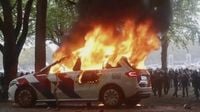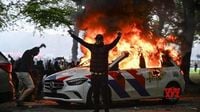On Saturday, September 20, 2025, the usually tranquil city of The Hague, Netherlands, was shaken by violent anti-immigrant protests that escalated into chaos, resulting in at least 30 arrests and injuries to two police officers. According to local authorities, including The Hague Mayor Jan van Zanen and Police Chief Karin Krukkert, what began as a demonstration against the Dutch government’s immigration policies quickly spiraled out of control, prompting a forceful police response and igniting a national debate just weeks before a pivotal election.
The protest, organized by right-wing activist Els Rechts and dubbed “Elsfest” by its supporters, drew thousands of participants from across the country. Many demonstrators, dressed in black and carrying Dutch flags as well as banners associated with far-right groups, converged on the Malieveld area of The Hague. Their demands were clear: stricter asylum laws and an end to what they described as mass immigration. As reported by Al Jazeera and Tempo, the demonstration was called in response to a social media campaign by Rechts, who has become a prominent voice in the anti-immigration movement.
But the protest’s initial peaceful intent was quickly overshadowed by violence. As the crowd swelled, some protesters began throwing bottles and stones at police officers, who responded with tear gas and water cannons in an effort to restore order. According to Antara and Algemeen Dagblad, rioters attacked not only police officers but also police horses and journalists covering the event. “We are facing an unprecedented explosion of violence. Peaceful demonstrations had to be disbanded because the safety of the participants could no longer be guaranteed,” Mayor Jan van Zanen stated, as quoted by Algemeen Dagblad.
The violence was not limited to skirmishes with law enforcement. Protesters set a police vehicle ablaze on the field, as captured in dramatic footage circulated by Popular Front and India Today. Others smashed ground-floor windows at the headquarters of the center-left Democrat 66 (D66) Party, viewed by many on the far right as a symbol of the progressive elite. Witnesses reported that a group gathered at the D66 office, shouting demands for the closure of refugee centers across the country, and set fire to garbage cans near the entrance. D66 leader Rob Jetten condemned the attack on social media, writing, “If you think you can intimidate us, tough luck. We will never let extremist rioters take away our beautiful country.” He added that the damage inside the party’s headquarters was extensive.
Police Chief Karin Krukkert confirmed that approximately 30 people were arrested, primarily for acts of violence against authorities. Some of those detained remain in custody, while others have been released pending further investigation. Authorities warned that additional arrests could follow as they review footage from the clashes. The two injured officers are reported to be in stable condition, according to Krukkert.
As the main protest was disbanded by city authorities, several aggressive groups lingered near the train station, continuing to provoke police and resist dispersal. Officers, equipped with batons, pursued and arrested remaining agitators, determined to prevent further escalation. The use of water cannons and tear gas, while controversial, was deemed necessary by local officials to protect public safety as the situation threatened to spiral further out of control.
The protest’s timing was no coincidence. It took place just over a month before Dutch voters are scheduled to head to the polls on October 29 in a snap election. This election was itself triggered by the dramatic collapse of the far-right government coalition earlier in June. Geert Wilders, leader of the far-right Freedom Party (PVV), withdrew his party’s ministers from the ruling coalition, citing the other parties’ failure to support his hardline plans to curb asylum for refugees. The collapse of the government has left the country in a state of political uncertainty, with migration policy emerging as a central—and deeply divisive—issue in the campaign.
Wilders, a polarizing figure who has long campaigned for stricter immigration controls, was invited to speak at Saturday’s protest but ultimately declined. Instead, he took to social media to denounce the violence, stating, “Blocking the highway and violence against the police is totally, absolutely unacceptable.” In another post, he referred to those responsible as “idiots,” making it clear that, while he supports the protest’s aims, he does not condone violent tactics. Wilders’ condemnation was echoed by other political leaders who, while critical of current immigration policies, warned that violence only undermines legitimate debate and democratic processes.
The events in The Hague have sparked a wider conversation about the state of Dutch society and the pressures facing its political system. Many on the right argue that the government’s approach to asylum and migration has failed, pointing to strains on housing and public services. They contend that the protest reflects genuine frustration among ordinary citizens who feel their voices are being ignored. As one group of protesters shouted outside the D66 headquarters, “Close the refugee centers!”
On the other hand, critics of the protest and its organizers warn that the rise of far-right rhetoric and tactics threatens the country’s social fabric. The attack on the D66 office, in particular, has been described by many as an attempt to intimidate political opponents and silence dissent. D66 leader Rob Jetten’s defiant response—“We will never let extremist rioters take away our beautiful country”—resonated with those who fear that violence could become normalized in Dutch politics.
For law enforcement, Saturday’s events posed a daunting challenge. The Hague Police Chief Karin Krukkert emphasized the unprecedented scale and intensity of the violence, noting that officers faced attacks not just from local residents but from agitators who had traveled from various regions of the Netherlands. The targeting of police horses and journalists added another layer of complexity, raising concerns about the safety of those tasked with maintaining order and reporting the news.
As the Netherlands braces for its upcoming election, the fallout from the anti-immigration protest is likely to reverberate well beyond The Hague. With migration policy at the forefront of the national debate and political parties staking out sharply divergent positions, the stakes could hardly be higher. Whether Saturday’s violence will galvanize voters, deepen divisions, or prompt a reassessment of how protests are managed remains to be seen. For now, the city of The Hague is left to pick up the pieces, both literally and figuratively, after a day that laid bare the tensions simmering beneath the surface of Dutch society.






